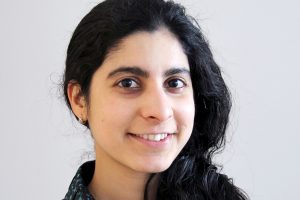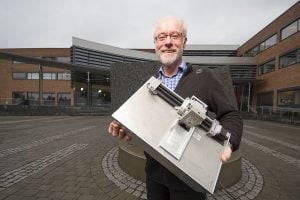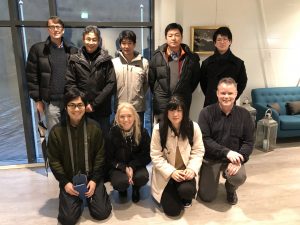
New PhD thesis shows that salmon kept in closed-containment fish farms on shore have better welfare in brackish water, and that they can live with higher density in a closed environment than in open sea pens. Atlantic salmon is the most important farmed-fish species in Norway, and the vast majority of the fish are raised…

Sharada Navada is a process engineer from India who, after working a couple of years in the USA and a year in Drammen, has just started her doctoral work at the CtrlAQUA center. She is an employee of Krüger Kaldnes and currently resides in Trondheim where she is doing her PhD at NTNU and Nofima,…

One of the main issues with closed-containment systems is that they incur higher investment costs than traditional rearing technologies, which implies higher production intensity. It is important to research whether salmon post-smolts can perform equally well, or even better, in these closed systems compared with open cages. That’s what Ingrid Gamlem’s master’s degree is about:…

Written by Reidun Lilleholt Kraugerud for the annual report 2016 of CtrlAQUA. Xiaoxue Zhang is a PhD student at NTNU Nanolab, working on the development of a material to apply to sensors in the water treatment systems. Before her arrival at CtrlAQUA, closed-containment aquaculture was totally new to Zhang but, once she had started, she…

Written by Reidun Lilleholt Kraugerud for the annual report 2016 of CtrlAQUA. In office premises in Horten, in the development company ORP – Oslofjord Ressurspark, you will find Bård Haug. On his shelves he has two patents, and in his head he has ambitions. The patents were the brainchild of his former colleague, Frank Karlsen,…

Written by Reidun Lilleholt Kraugerud for the annual report 2016 of CtrlAQUA. Bremnes Seashore is building recirculating aquaculture systems (RAS) for smolt on land. This is part of a long-term strategy based on a detailed assessment of the future production of salmon with little sea lice. “We have tested many options but are now focussing…

Written by Reidun Lilleholt Kraugerud for the annual report 2016 of CtrlAQUA. The first company out as an SFI partner is Botngaard AS from Bjugn. They joined CtrlAQUA in 2016. When they were established in 2009, they supplied delousing tarpaulins for fish farming facilities. Since 2010, they have taken the next step and developed a…

In its second year, scientists, farmers and technology suppliers at the CtrlAQUA Centre have researched and acquired new knowledge about farming in closed-containment aquaculture systems. Such knowledge will contribute to the Centre’s ambition to make closed systems off-the-shelf products. Choose one of the following versions: Reader friendly version Printable version If you’d like a professionally printed…

For Norway to be the best at closed-containment aquaculture systems (CCS) for salmon, we need knowledge from the best of the best. Norway’s researchers are now working with leading Japanese and North American researchers. Research on salmon’s needs is the key to creating sustainable production in CCS. This can reduce problems with sea lice and…

Written by Andreas R. Graven, Uni Research Less stressed fish as well as shorter production periods, make salmon farming more efficient and profitable, new experiments suggest. The new experiments are led by Uni Research in CtrlAQUA, and indicates som of the advantages of using CCS and SCCS facilities. How farmed fish handles stress and adapt to changes…










